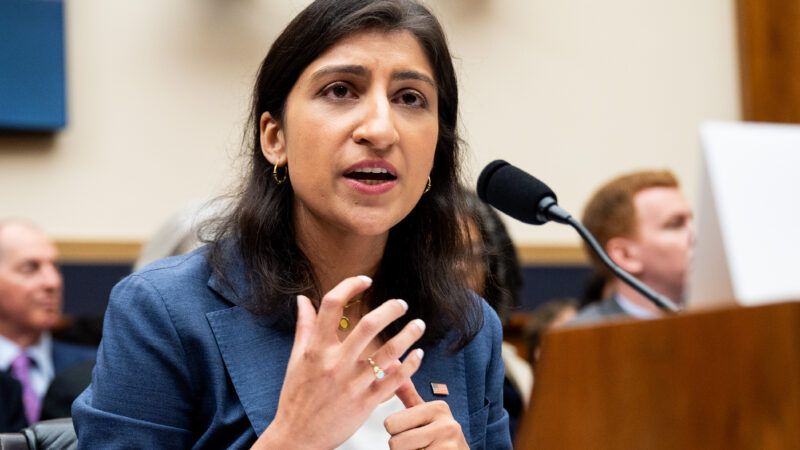Another Illegal Power Grab From the FTC
Banning noncompete agreements goes well beyond the FTC's legal authority.

More than 30 million Americans have signed employment contracts that limit their ability to switch jobs to a competing company, and those contracts are regulated by laws in 47 states.
The Federal Trade Commission (FTC) swept all of that aside in one fell swoop this week, as the commission voted down party lines to ban future noncompete agreements and to block the enforcement of many of those existing contracts. (The retroactive ban on noncompete agreements does not apply to senior-level employees.) Even for an agency that has sought in recent years to stretch its regulatory reach, the new FTC rule banning noncompete agreements is a stunning expansion of federal power—one that courts almost certainly will be asked to rein in.
Banning noncompete agreements is "not only unlawful but also a blatant power grab," said Suzanne P. Clark, president and CEO of the U.S. Chamber of Commerce, in a statement. "This decision sets a dangerous precedent for government micromanagement of business and can harm employers, workers, and our economy."
The chamber is already preparing to sue the FTC over the new rules, Clark said. That lawsuit could be filed as soon as Wednesday, according to The Wall Street Journal.
FTC Commissioner Lina Khan says the new rule "will ensure that Americans have the freedom to pursue a new job, start a new business, or bring a new idea to market."
But the commission's legal authority to issue such a rule seems extremely tenuous. The FTC claims that section Sections 5 and 6(g) of the Federal Trade Commission Act grant it the authority to regulate "unfair methods of competition," which may include things like noncompete agreements.
Traditionally, the FTC has operated more like a law enforcement agency—that is, going after firms and industries that engage in anti-competitive behavior like price fixing or that hold monopolies. In issuing this rule, the commission is trying to switch gears towards being a regulatory agency that can promulgate sweeping rules applying to the whole economy. In doing so, Khan is pushing against the commission's history and decades of legal precedents.
The Supreme Court has twice struck down attempts by the FTC to expand its regulatory authority via those sections of the law, as lawyers for TechFreedom explained in comments to the FTC filed last week. "The text and structure of the FTC Act establish, beyond a shadow of a doubt, that Section 6(g) does not empower the agency to issue substantive rules, that is, rules with the force of law," wrote Berin Szóka and Corbin Barthold.
"The final rule to ban all noncompete agreements nationwide—except existing noncompetes for senior executives—is a radical departure from hundreds of years of legal precedent," Ben Brubeck, vice president of the Associated Builders and Contractors, said in a statement. "Ultimately, this vastly overbroad rule will invalidate millions of reasonable contracts—including construction project contracts—around the country that are beneficial for both businesses and employees."
Three states—California, North Dakota, and Oklahoma—already ban noncompete agreements. New York Gov. Kathy Hochul, a Democrat, vetoed a bill last year that would have banned those contacts in her state. That demonstrates that there is a robust, ongoing (and not particularly partisan) policy debate over noncompete agreements at the state level—a debate that the FTC has bigfooted with its decision on Tuesday.
The two Republican appointees to the FTC voted against the new rule on Tuesday. In a dissenting statement, both expressed the belief that the commission was overstepping its bounds.
Alden Abbott, a former FTC general counsel now working as a senior research fellow at the Mercatus Center, said in a statement that the FTC lacks the statutory authority to ban noncompete agreements. Even if the commission did have the authority to take such action, Abbott argued that a "one-size-fits-all" federal approach to regulating those contracts would be inferior to the longstanding practice of letting states regulate them.
"Non-competes have throughout our history been a matter of state law, allowing for fruitful policy experimentation among the states, consistent with American federalism," said Abbott. "Three politically-appointed bureaucrats who are not accountable to American voters should not possess the sort of power that the FTC is asserting over non-compete agreements."


Show Comments (44)